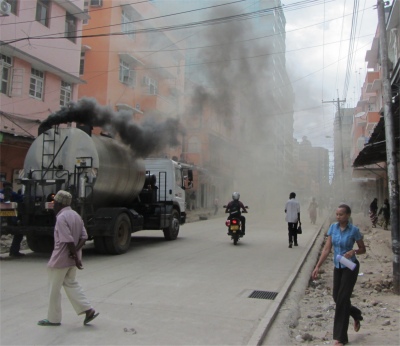 No Problems with Pollution Control Here |
When I interacted with the staff, I tried as far as possible to communicate in Swahili, a far cry from when I first breakfasted here 17 days ago. They were tickled pink and became quite animated when I did so, repeating what I had said in stunned amazement. I got the impression not many non-East African visitors to the hotel try to speak their native tongue, they certainly appreciated my amateurish attempts.
Leaving my luggage at the hotel, I set off to navigate my way to the Kivukoni Fish Market. I had greater ease finding my way around the maze of alleys in Stone Town than picking a route across Dar es Salaam. My landmarks here were the street running through the town that was closed for repairs, and the pair of adjacent mosques.
On my way I came across a 3-phase high voltage transformer standing on the ground. Cables snaked out of the ground and were bolted onto the exposed terminals. I stood in awe, how could this be? If the cables were live, then it would represent a lethal piece of kit waiting for a disaster to happen. It was beyond my comprehension, and if it rained, what then? I scratched my head in disbelief and walked away.
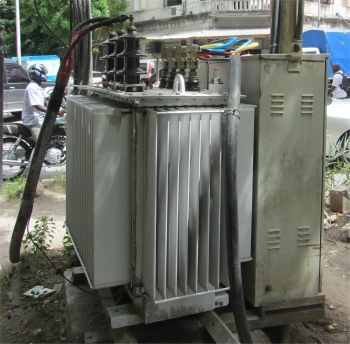 Potentially Lethal High Voltage Transformer |
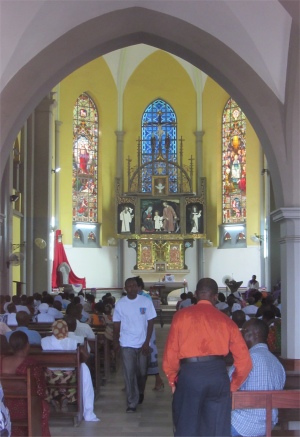 Looking into St Joseph's Cathedral |
The Kivukoni Fish Market was organised into different areas. There was an auction area (sadly I was too late for the action here), stalls for cleaning, a freezer, areas dedicated to large fish with a separate outside one reserved for small fish and shrimp. In these sections, fish were displayed in neat mounds and lined up in rows.
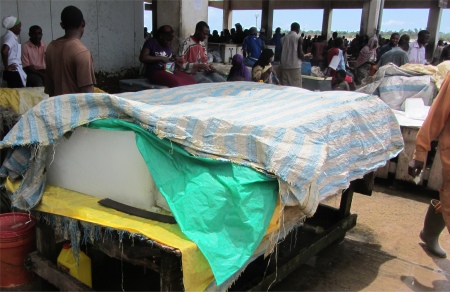 The Ice Men Cometh |
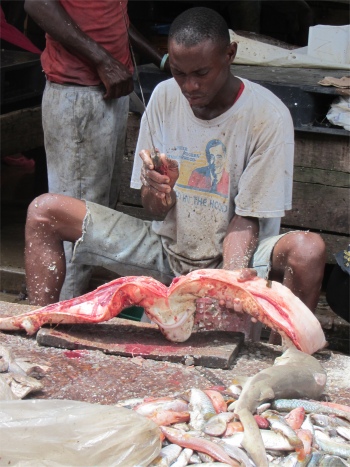 Fish for the Chop |
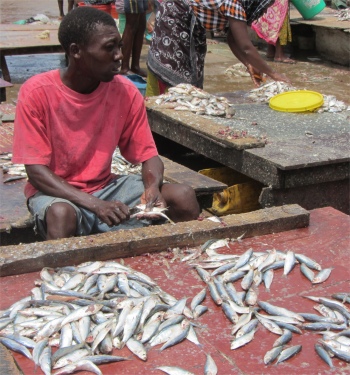 Processing on Autopilot |
Hand carts laden with vast blocks of ice stood in an aisle, which an army of lads attacked with machetes to produce bucketfuls of ice for the legions of fishmongers.
The sea wall ran alongside the market, and a swathe of golden sand quickly fell away to the sea's edge. A collection of wide, almost barge like fishing vessels floated by the shore, swarming with groups cleaning the decks down. Along the water's edge, the colourful hindquarters of several women pointed skywards, the ladies engrossed in cleaning the contents of large bins in the sea water.
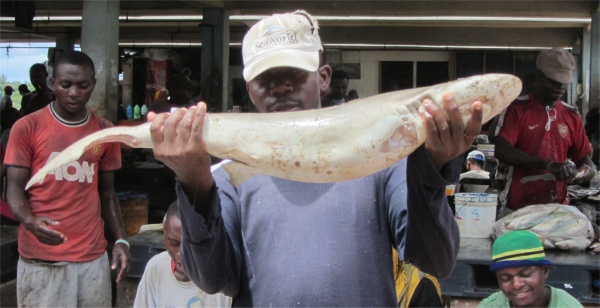 It was that Big |
One enclosed end of the market was totally under the control of a mass of women, and comprised two identical sections. Each section contained an earthen floor "central reservation", on which numerous cast iron charcoal burning braziers heated cauldrons of bubbling fish, soups and quantities of unknown other dishes, many being stirred two-handedly with huge paddles. Iron tables also stood on the earth floor, where women prepared all manner of dishes. Along either side of each central reservation were stone floors, on which tables and benches stood.
People milled up and down the small aisles between the seating areas and the cooking area: market workers, fishermen, locals and the odd foreigner. I became one of the milling crowd, and noticed some tasty pancakes being prepared. I asked the lady making them what the price was, and within no time at all she had managed to persuade me to buy two, and I had been pointed to a place where I should sit. She nodded across to a warm water urn, and using actions, made it clear I should wash my hands first under the dribble. Did I want fish with my pancakes? No, I didn't. Did I want tea? Yes, please. The lady called to someone further along the cooking area, and a minute later a mug of scalding hot sweet lemon tea was delivered to me. An African chap sat next me, guzzling a large bowl of "grey" fish, which he explained to me was sea salmon. He munched through it and pancakes with great gusto. I enjoyed my tea and pancakes, sitting on my bench watching the commotion all around me. These women were hard working, sharp sales-women too. As I got up to leave, I was politely told to wash my hands again.
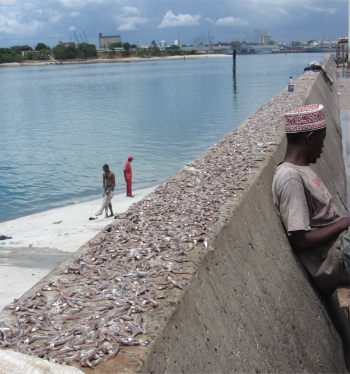 Small Fry Drying on the Sea Wall |
Braving the merciless sun, I set off walking back to the city centre through the fumes of traffic which was going nowhere fast. For one moment I wondered if I stunk of fish; I had been sat on a fishy bench by a fishy table, and had walked along floors running with fish innards and scales. What the hell, this is Africa, though Oman might not appreciate it when I land there just before midnight.
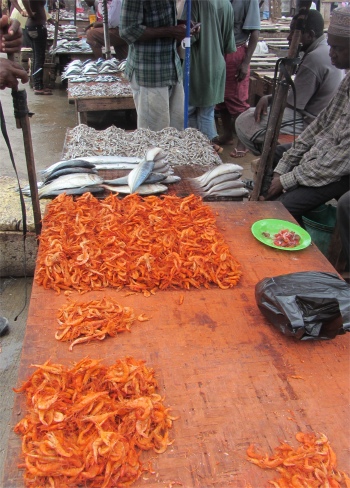 Who Will Buy My Wares? |
Meanwhile, the world carried on around them; people, bikes, motorbikes and handcarts just weaved between the workers regardless. There was no demarcation zone between road works and the rest of the world. And if a toddler happened to get flattened by a steam-roller, what then?
The time had come to take my leave of this land. My cab driver to the airport decided to take a longer route, the direct one being gridlocked. Even the longer route had its fair share of problems; tuk-tuks broken down on roundabouts, trucks broken down, and cars being pushed in the fast lane. My driver was not averse to going around roundabouts the wrong way!
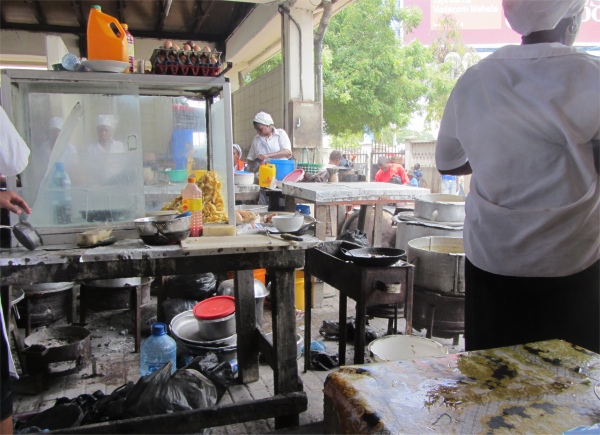 Women's Cooking Area in the Market - Cauldrons of Soup and Fish Bubbling Away |
I'd had two very brief stays in Dar es Salaam. Sally had told me that there is a better side of town about 30 minutes way. However, the centre where I was based was very run down and lacking in facelifts. By day, the place was awash with taxi touts and people begging. At night shadows lurked within shadows. I never felt threatened, but I was constantly on my guard. Fortunately the fish market gave me an uplifting experience.
In the early evening my big bird swept high above the turquoise Indian Ocean, behind me that great continent of Africa gradually melting into a golden smudge below the setting sun, before fading into an indigo haze that was swiftly engulfed by darkness. Unseen far below me, I traversed the Indian Ocean towards the Arabian Sea that skirted the south-eastern shores of the Arabian Peninsula. By the time my plane reached the Tropic of Cancer it was circling over the Gulf of Oman picking out its final descent to Muscat, capital of Oman.
A short while later I had purchased my Oman visa, and was trying to decipher the maze of tape barriers, the type used to herd long lines of people and drive them insane as they see their objective 25 layers along. I managed to make my way down to the front row without being reduced to a twitching wreck, and to my horror saw an iris scanner being brought into operation back at the start of my queue. It had been idle and not manned when I passed it earlier, but now a line of folk were lined up for an iris scan. Crumbs, I would be fuming if I was sent back to the beginning again. But the Gods looked down on me favourably.
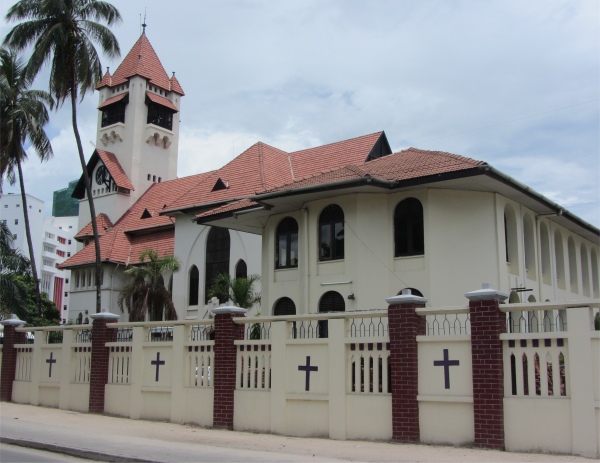 Azania Front Lutheran Church |
Now cars like mine have a CD player in them, and more advanced ones have satellite navigation. This chap had a DVD player and a screen showing a film in the middle of his dashboard. I hoped it was for my benefit and not for his. It wasn't much use to me, I couldn't understand a word being said.
After checking in, I retried to the hotel's small bar to unwind over a beer. It was after 1am and a cool 28 degrees outside. I also took the opportunity to catch up with the rest of my family on their different time zones; thankfully my phone worked in Oman. In the background a small stage stood, on which a young fellow operated a laptop that performed the same function as a karaoke machine, and two pretty Oriental girls, wearing tight green dresses that barely covered their nether regions, sang a selection of music, with the chap adding backing vocals. They were quite talented, and had an excellent command of English music. By the bar, a middle-aged Chinese chap joked and laughed with a woman who I presumed to be his wife. She wriggled and jiggled her body while he clapped to the music.
There was a handful of tables at which the only two other customers sat. One of the customers was a tall, slim but powerful looking Arabic chap, sat close to the singers. At the back wall, the other customer sat, a stocky, jovial chap wearing traditional white robe and hat. He waved his arms and body about like a puppet on a string, totally out of sync with the music, but he was clearly enjoying himself.
I savoured my ice cold beer and caught up with my notes, before drifting off to bed.

